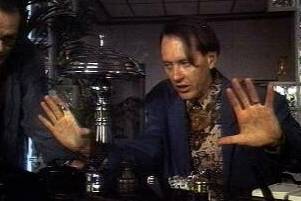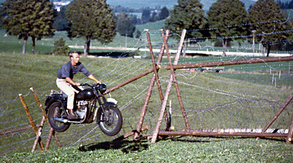 Every successful screenwriter I know is brilliant at pitching. The ability to pitch well accelerates every aspect of your career in cinema or TV - from coming up with new ideas to developing them, and of course selling them. Last time, we started by looking at your seed image. If you missed the article, read it here). This time, we’re getting stuck into the pitch or log line. Why have a pitch at the start? A good log line is essentially a one or two sentence pitch which has something magical that makes your listener’s eyes light up - this is the spark. Nowadays I never start writing a script unless I have a log line with that spark - after all the first person I have to sell the idea to is myself. As I write, and then as I edit, the pitch helps keep the script focused. And at the end, the pitch is central to selling it to producers. What’s your pitch? There’s a certain magic you need in creating a good idea that you can’t force into existence. But you can create the right conditions for finding it. And you can do that right now. You don’t have to be clever, you have to be imaginative, disciplined and committed to not accepting second-best. And you need three ingredients to make the pitch work: 1. What’s your genre? Ingredient one is the genre - in other words, what kind of story is this going to be? Will it make people laugh, or cry, or scream in horror? Or what? Genre is first and foremost about the emotion you want to create in the viewer. The seed image probably gave you a hint of that emotion. Now is the time to dig deeper into your imagination. Imagine the audience watching your work on screen. What do they feel? 2. Who does what? Ingredient two in a good pitch is the Outer Story. Who is your protagonist and what does he or she want? Focus on the big decision that underpins the whole story. In Hamlet it’s the decision to avenge his father’s murder. In Joy it’s the decision to invent a self-wringing mop. It’s an “outer” story because we have to film it - in other words it’s not just inside their head. 3. What’s their flaw? By contrast, ingredient three is the Inner Story. What is the inner flaw that’s stopping the protagonist from progressing? On its own, the outer story is rather thin and mechanical. This inner struggle gives it depth. Hamlet has to conquer his fear of taking action (he fails to do this in time, which gives us a tragic ending). Joy has to learn to stand up for herself. If, she does that she’ll earn her happy ending. In some stories, you find a mix, part growth, part failure, giving a bittersweet end. Put it together To create your pitch, put them together: GENRE plus OUTER STORY plus FLAW. Hamlet is a revenge tragedy about a young prince who must avenge his father’s murder but must confront his own fears before he can confront the murderer. Joy is a comedy-drama about an insecure but ambitious young woman who sets out to invent the world’s first self-wringing mop and must learn to stand up for herself if she’s to succeed Where’s the rest? Where’s the rest of the play? The brilliant writing? The subtle interrogation of philosophy? The other characters? The subplots? They don’t belong here. Don’t confuse the log line with the script. The job of the pitch is simply to excite - to excite you enough to write the screenplay and then to excite producers enough to read it! That simple sentence can take hard work to write. You need to focus hard on the absolute essentials, and cut away everything else - your 90+ page idea boiled down into a single line. But if you get it right, it will form the foundation of everything you do next - whether that’s writing the outline, editing a draft - or indeed selling it. Next: Writing the treatment.
1 Comment
 Can your competition entry make a Great Escape? Can your competition entry make a Great Escape? Charles Harris Yes, I know, your competition entry is unique and took months of blood and tears, but I've read hundreds, if not thousands, and I see the same problems time and time again. So, bear with me. See if any of these could possibly apply to you. 1. Your treatment doesn't match your script There's too much about the beginning, too little about the middle, and almost nothing of the end. The first page and a half of your two page competition treatment correspond to the opening 30 minutes - with the second act taking up a third of a page and the ending crammed into a sentence at the end. Does this ring a bell? We all know how difficult it is to explain all that stuff you need to know at the start... so, don't. We actually don't need all that information. Tell us the story - in proportion. A quarter of the treatment should equal a quarter of the film. It's tough, I know. But that's the job. (Of course it could be that your script really does spend an hour and a half setting things up, in which case, boy, have you got problems!) 2. Your protagonist doesn't drive the story Your treatment is so busy telling me all the awful things that happen to her, that your protagonist never gets round to doing anything for herself. Her actions, if they exist, are reactions. Your protagonist must take the story by the scruff of its neck, and make things happen. She must decide on a goal and go for it. I don't care if it's thriller action like Gravity or gentle indie romance like Juno, she has to drive the story forwards by her own actions. 3. The basic premise or pitch of the treatment/script is flawed This is the biggie. The most common fault with the competition entries I see, and most difficult. You can sometimes fix the other two, if the idea behind the treatment is strong to begin with. But if the premise is weak, there's nothing there. Most competition treatments have one good idea, maybe one-and-a-half, but a great premise needs at least two good ideas, maybe three. Often, those ideas are there, half developed in the writer's mind, but need to be brought out. As a competition judge, I can only go by what you write. If the ideas aren't on the page, I can't guess at them. It's a shame. I'm sure many treatments and scripts could be great, if the premise had been developed more clearly. Get your entries ready for the Euroscript Screen Story Competition 2014 If you win the Euroscript Screenwriting Competition you'll get three full script reports (usually running to 10-15 pages) on three drafts of your screenplay and as many meetings, telephone conversations and as much email correspondence as you need with your Script Editor. This intensive script development programme has one goal: to get your screenplay ready for market. Deadline for entries 31st March. See full details of the Euroscript Screen Story Competition 2014 And if you want to fix your premise/pitch... ...I'm running a weekend workshop on selling and pitching to help you develop the best premise for your treatments and scripts. You get two days of practical information on what producers and agents want to see and how to approach them for the best results. Plus intensive work on your individual premise/pitch with personal feedback. January 25-26 - there are a few places left.
Find out more about the Complete Selling and Pitching Weekend now. |
BLOGTHE ONLY PLACE TO TALK ABOUT THE CRAFT OF SCRIPTWRITING.
|
Privacy Policy © Euroscript Limited 2020

 RSS Feed
RSS Feed


